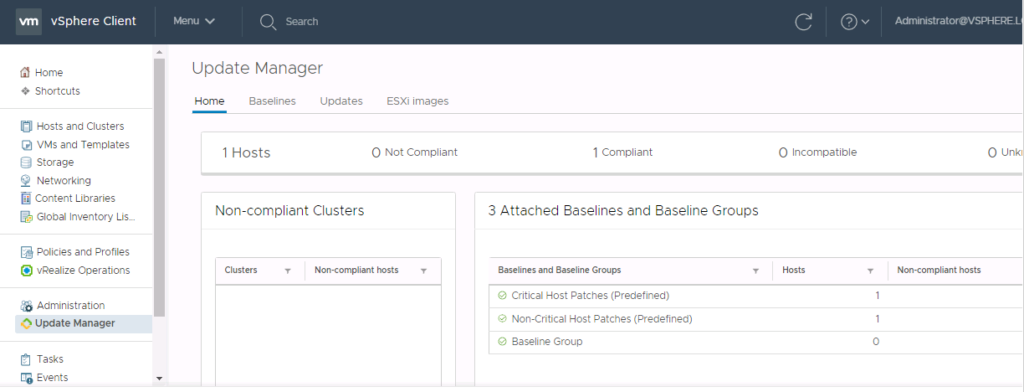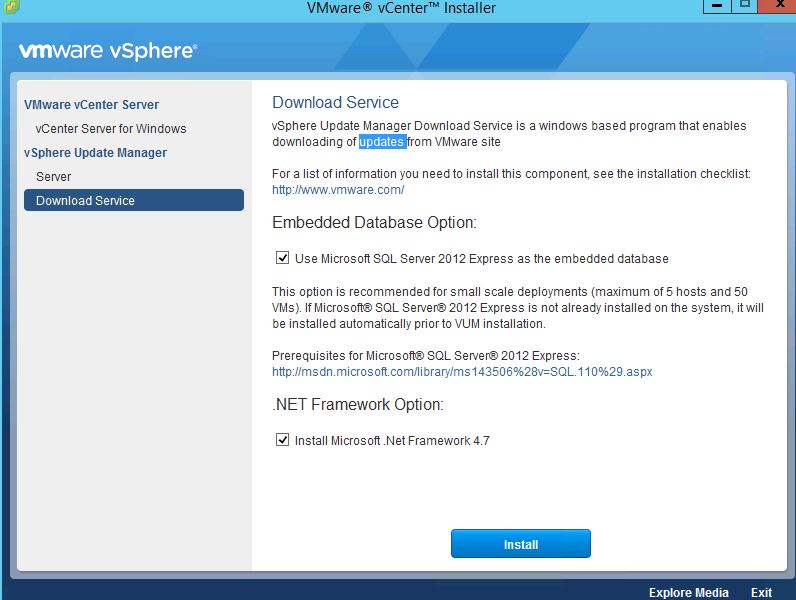VMware vSphere 6.7 has been announced by VMware recently and there are many enhancement and new features are available with this release.In this post am sharing details about update manger in vSphere 6.7 .With vSphere 6.7 version update manager module consists of a server component and client components for the vSphere Client (an HTML5-based GUI) and the vSphere Web Client (a Flex-based GUI).
- With vSphere 6.7 update manager (VUM) is accessible through HTML5 web client with limited functions .You have to still use the Web Client Flex for rest of the features accessibly .

- Update Manager on vCenter 6.7 or the UMDS that runs on Windows requires Microsoft .NET version 4.7.Installing or upgrading vCenter Update Manager or UMDS on version 6.7 required .NET 4.7 or to upgrade your existing .NET version to 4.7 .

- With Quick Boot option on vSphere 6.7 Update Manager will reduce the time an ESXi host spends in maintenance mode during remediation. This is available from Update Manager configuration settings, and the remediation wizard. Quick Boot is supported on limited platforms and systems , Supported platforms , Refer – KB .
- Virtual appliances upgrades with Update Manager is deprecated , Upgrade and patch operations of virtual appliances is deprecated in Update Manager 6.7.
Find the below supported and unsupported functionalities of vSphere update manager with HTML5 and Flex Client .
Supported Functionality in the vSphere Web Client (HTML5 )
| Update Manager Functional Area | Supported Functionality in the vSphere Web Client (HTML5 ) |
| Configuration Settings | Unsupported |
| Patch Repository | Download patches manually to the repository |
| Import patches | |
| Add/Remove baselines that include a particular patch | |
| Baselines | Create Patch Baselines |
| Edit Patch Baselines | |
| Create Extension Baselines | |
| Edit Extension Baselines | |
| Create Host Upgrade Baselines | |
| Edit Host Upgrade Baselines | |
| Delete Baselines | |
| Baseline Groups | Create a Host Baseline Group |
| Edit a Baseline Group | |
| Delete Baseline Groups | |
| Scan | Check Compliance for Hosts & Clusters |
| Working with Baselines and Baseline Groups | Attach host baselines |
| Detatch host baselines | |
| Delete host baselines | |
| Attach baseline groups | |
| Detatch baselines groups | |
| Delete baselines groups | |
| Pre-check remediation | Pre-check remediation |
| Stage | Stage all patches to hosts or none |
| Remediating Hosts & Clusters | Remediation against predefined patch baselines (limited functionality) |
| Remediation against custom patch baselines (limited functionality) | |
| Remediation against extension baselines (limited functionality) | |
| Remediation against upgrade baselines (limited functionality) | |
| Remediation against baseline groups (limited functionality) | |
| Remediating vSAN clusters | Remediation against system-managed baselines |
| Remediating VMs | Unsupported |
| Monitor Update Manager Events&Notifications | Update Manager related events are displayed in global vSphere Client events list. |
| Monitoring of Update Manager notifications are unsupported. | |
| Scheduling Update Manager tasks | Unsupported |
| Update Manager compliance view | Compliance info cards that are available from the Updates tab: |
| Summary card of the selected host or cluster | |
| Compliance information card of the selected host or cluster | |
| Pre-check remediation card of the selected host or cluster |
Supported Functionality in the vSphere Web Client (Flex-based GUI)
| Update Manager Functional Area | Supported Functionality in the vSphere Web Client (Flex-based GUI) |
| Configuration Settings | Change the Update Manager Network Settings |
| Configure the Update Manager Proxy Settings | |
| Configure the Update Manager Download Sources | |
| Configure Checking for Updates | |
| Configure Notifications Checks | |
| Configure Host and Cluster Settings | |
| Configure Using Quick Boot | |
| Configure Host Maintenance Mode Settings | |
| Configure Cluster Settings | |
| Enable Remediation of PXE Booted ESXi Hosts | |
| Take Snapshots Before Remediation | |
| Configure Smart Rebooting | |
| Configure the Update Manager Patch Repository Location | |
| Patch Repository | Download patches manually to the repository |
| Import patches | |
| Add/Remove baselines that include a particular patch | |
| Baselines | Create Patch Baselines |
| Edit Patch Baselines | |
| Create Extension Baselines | |
| Edit Extension Baselines | |
| Create Host Upgrade Baselines | |
| Edit Host Upgrade Baselines | |
| Delete Baselines | |
| Baseline Groups | Create a Host Baseline Group |
| Create a Virtual Machine Baseline Group | |
| Edit a Baseline Group | |
| Add and Remove Baselines to a Baseline Group | |
| Delete Baseline Groups | |
| Scan | Scan Hosts |
| Scan Clusters | |
| Scan VMs | |
| Working with Baselines and Baseline Groups | Attach host baselines |
| Detatch host baselines | |
| Delete host baselines | |
| Attach VM baselines | |
| Detatch VM baselines | |
| Attach baseline groups | |
| Detatch baselines groups | |
| Delete baselines groups | |
| Pre-check remediation | Pre-check remediation |
| Stage | Select patches to stage to hosts |
| Remediating Hosts & Clusters | Remediation against predefined patch baselines |
| Remediation against custom patch baselines | |
| Remediation against extension baselines | |
| Remediation against upgrade baselines | |
| Remediation against baseline groups | |
| Remediating vSAN clusters | Remediation against system-managed baselines |
| Remediating VMs | Remediation against predefined VM baselines |
| Monitor Update Manager Events&Notifications | Update Manager related events are displayed in global vSphere Web Client events list. |
| Monitoring of Update Manager notifications is available from the Update Manager Admin view under Monitor tab. | |
| Scheduling Update Manager tasks | Schedule scan and remediate operations from Task&Events under the vSphere Web Client Monitor tab. |
| Update Manager compliance view | Unsupported |
Check the below VMware reference web page to understand more about Update Manager and learn

